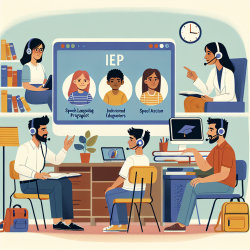Individualized Education Program (IEP) planning and meetings are critical components of providing effective speech therapy services in schools. As Speech Language Pathologists (SLPs), your role in these processes is pivotal. This blog aims to provide insights and strategies to help you navigate IEP planning and meetings more effectively, ensuring that each student's needs are met comprehensively.
Understanding the IEP Process
The IEP process is designed to create a tailored educational plan for students with special needs. It involves several steps:
- Assessment: Evaluating the student's current abilities and challenges.
- Goal Setting: Establishing measurable, achievable goals for the student.
- Service Delivery: Determining the type and frequency of services required.
- Progress Monitoring: Regularly reviewing the student's progress and adjusting the plan as needed.
Effective IEP Meetings
IEP meetings bring together educators, therapists, parents, and sometimes the students themselves. Here are some tips for making these meetings productive:
- Preparation: Review the student's file, assessments, and progress reports beforehand. Prepare a draft of potential goals and services.
- Collaboration: Foster a collaborative environment where all team members, including parents, feel valued and heard.
- Clarity: Clearly explain the proposed goals, services, and the rationale behind them. Use language that is accessible to all participants.
- Flexibility: Be open to feedback and willing to adjust the plan based on the team's input.
Utilizing Online Therapy Services
With the rise of online therapy services, many schools are now incorporating virtual speech therapy into their IEPs. Here are some benefits:
- Accessibility: Online therapy makes it easier to provide consistent services, even in remote or underserved areas.
- Flexibility: Sessions can be scheduled at times that are convenient for both the student and the therapist.
- Resources: Online platforms often come with a wealth of digital resources and tools that can enhance therapy sessions.
Involving Parents in the IEP Process
Parents play a crucial role in the IEP process. Their insights and support are invaluable. Here are some ways to involve them effectively:
- Communication: Keep parents informed about their child's progress and any changes to the IEP. Regular updates can build trust and collaboration.
- Education: Provide parents with resources and information to help them understand the IEP process and their child's needs.
- Empowerment: Encourage parents to share their observations and concerns. Their input can provide a more holistic view of the student's needs.
Conclusion
Effective IEP planning and meetings are essential for delivering high-quality speech therapy services in schools. By preparing thoroughly, fostering collaboration, and utilizing online therapy services, SLPs can ensure that each student's IEP is tailored to their unique needs. Involving parents in the process further enriches the plan, making it more comprehensive and effective.
Remember, the goal of the IEP process is to provide students with the support they need to succeed. As SLPs, your expertise and dedication are crucial in achieving this goal.










